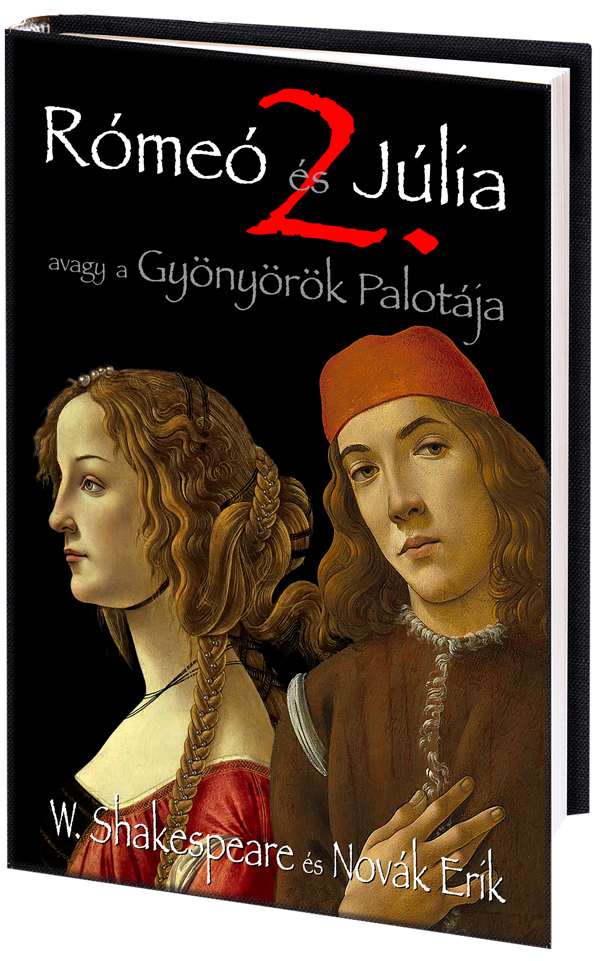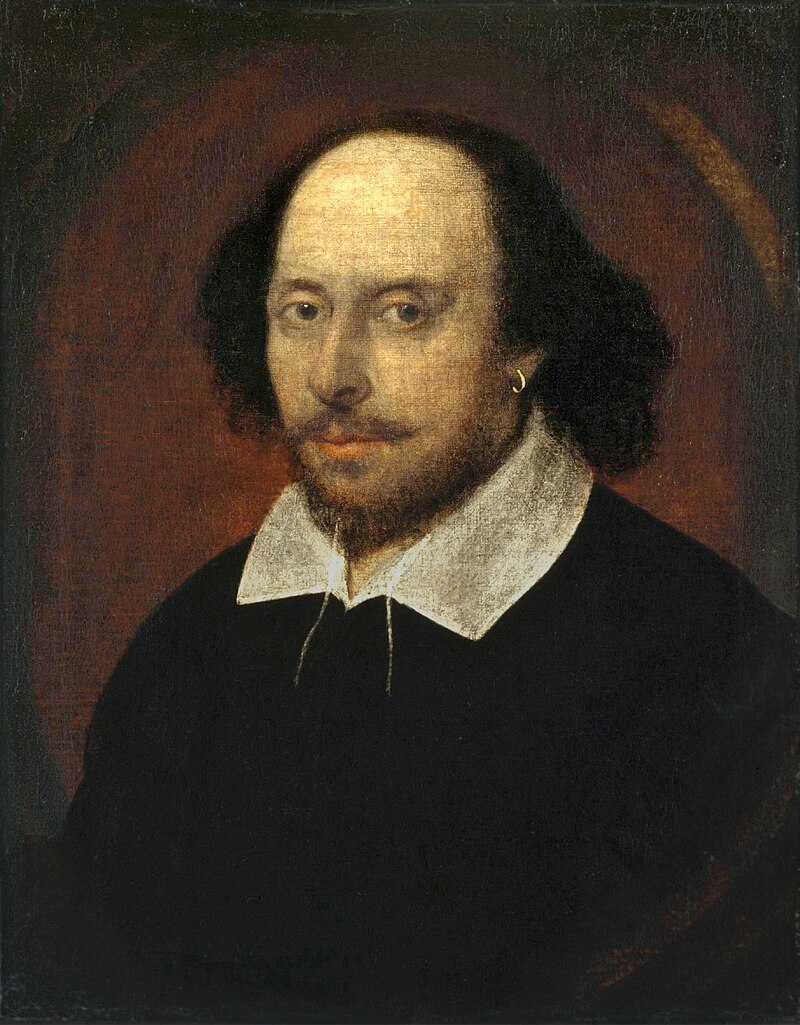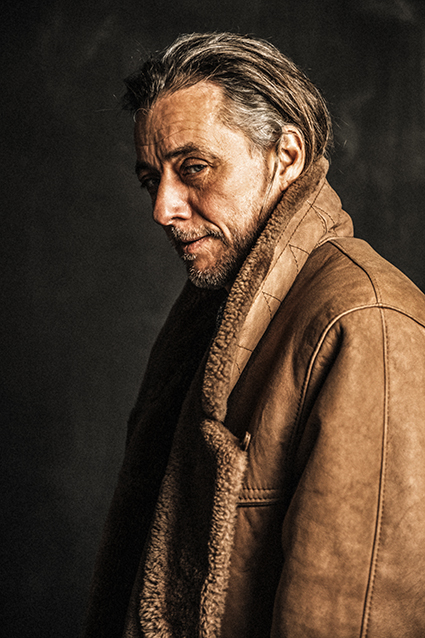The Book
The story of Romeo and Juliet has fueled people’s imaginations for centuries because it is not easy to find a category for the play. Is it a tragedy? But then someone should have committed a tragic error. Or a colossal streak of bad luck? But then why is it interesting and instructive? It is hard to accept that the story is just this and no more; in this book, Erik Novák puts forward an inventive possible sequel. They don’t die (or at least…but I can’t say anything). What we have is a true Renaissance horror tragedy, with additional characters, adventures, Venice, and a more grown-up, bitter, cynical world.
I recommend it to everyone because this is a good play, regardless of Shakespeare!
Ádám Nádasdy,
Translator of Shakespeare, poet, linguist
Innocence is dangerous. Shakespeare knew this quite well: in Romeo and Juliet, pure love leads to tragedy and the death of five young people. But what happens if the story does not end this way, if the two lovers happen to survive? Can two young people thrive in an adult world, will their love survive the test of reality in Renaissance Italy? The answer is given by Erik Novák and his co-author, who wrote a play which reads both like one conceived by a contemporary of Shakespeare and by a present-day playwright. In their exciting story, full of twists and turns, Renaissance Italy comes to life again, and the young lovers take on real-life, fallible human forms. Will Romeo and Juliet survive the loss of their innocence?
You will see when you read the book.
Natália Pikli,
Shakespeare researcher, theater historian, university associate professor
The Author’s Foreword:
Why did I deem it important to write a sequel of the world’s best-known literary work, which has been seen in countless editions, theatre performances, musical and film adaptations and which has remained a universal topos in humanity’s common cultural heritage for more than four hundred years? Why did I write a sequel to a non-continuable work? It cannot be continued, because in the original the love of Shakespeare’s protagonists, Romeo and Juliet, ends in tragic death for both of them, meanwhile killing three more young people. The tragedy that occurs at the end of a series of human errors and “accidents” has seemed unacceptable for me since my childhood. Why doesn’t Friar Lawrence announce the marriage of the young couple immediately, thereby resolving the ancient feud between the families? Why doesn’t the Nurse tell anyone? Why doesn’t Romeo tell Tybalt before they engage in a duel to the death that it is already kin against kin? Why doesn’t Juliet tell her parents about their marriage when they want to give her away to Paris? Why doesn’t Friar Lawrence go to the vault earlier? Why does he leave Juliet there alone? Why entrust the fate of young people to a letter? Because otherwise the dramatic conclusion would not be possible. There would be no catharsis. Shakespeare had to kill his lovers at all costs. But what is left when the sweet icing of overwhelming love is removed from the story?
It is due to Shakespeare’s genius that even though he gives us all the clues to see what it’s really about, we only see what we want to see: the greatest, truest love in the history of the world. The big, pink balloon that he blows around the essence of the story…
Who are the lovers? Juliet, ahead of her time, is one of the first proto-feminist female characters in world literature. She has her own will, so do her father and mother – not to mention her Nurse -, the executors of her whims.
She has had a sheltered life, she grew up as a spoiled single child, and now is a 14-year-old adolescent girl on the verge of puberty. She was protected even from the wind by her rich and powerful parents, she got whatever she wanted, she was the apple of their eyes, their only daughter and heir, who was forbidden only one thing: to cast her eyes on the son of the hostile House of Montagues. And it’s human nature to always want what you can’t have…
Romeo, the 16-year-old Montague boy, lives the carefree life of the best and finest of Verona aristocracy with his friends, who are also untouchable members of the highest status. What provides excitement in their lives are who-dares-if-not-me bantering, duels and street violence that goes unpunished due to their social status and the pursuit of unfulfilled chivalric love. They share a Romantic spleen, a gentleman’s death wish. Romeo lives his life in full protection until the beginning of the drama, he bypasses reality or cuts through it. He has not yet had a relationship with a real flesh-and-blood girl, Rosaline is an idea in whom one can love the concept of love.
Great love begins by it being forbidden. Romeo shouldn’t go to the enemy’s ball; despite his mask, he is recognized by Tybalt, the arch-enemy, the other “cock of the walk “, and he would kill him right there if Capulet did not stop his nephew to save the “ancient feast”. And then Juliet, a bit tipsy, sees him for the first time among the “adults”, with hormones raging in her blood, and the boy enchants her with his beauty… and vice versa. Love blooms and skyrockets for both when they find out that the other person is taboo, is untouchable, that it is their heritage to hate each other. “O hate, mother of love…” Of course, this whips up their hormonal storm to the extreme – and Romeo climbs the walls of the enemy’s house and here comes the balcony scene, the most beautifully written love-at-first-sight scene among all love scenes, which will remain in history and cultural memory forever. Full disclosure, ecstasy, promises, counter-promises, vows and compliments, compliments and more compliments. The next day they get married in secret. What could go wrong? A few hours have passed since they met, thirty sentences have been spoken. Completely solid ground for a life-long commitment… let anyone who have not yet promised marriage at first sight throw the first stone at them.
From then on, everyone keeps lying, as if they were to lose by telling the truth: Friar Lawrence lies, the Nurse lies, Romeo and Juliet lie… as a result, Tybalt dies, Romeo is exiled, Juliet swallows poison, and she lies ‘dead’ in a vault, Friar Lawrence makes a mistake, leaves the letter in the wrong hands and arrives late at the crypt, Romeo commits suicide when he sees the unconscious Juliet, Juliet wakes up and, finding her love dead, she also commits suicide next to him. Everyone is crying, on and off stage, even on their way home, the auditorium is packed, all the tickets are sold out! Poor things… but they loved each other so much!
I had the following idea: what would happen to their love story, canonized throughout the world as the greatest, the most beautiful, the most tragic, if we took away the tragedy from it? If the poor lovers don’t die? If some coincidence doesn’t happen the way it does in Shakespeare… If Friar Lawrence arrives on time and his plan succeeds… What if? I only had to start on this trail of thoughts and think about the logic of the Shakespearean story thoroughly, knowing the characters, knowing the social conditions of Renaissance Italy, and knowing the basic driving forces of human nature. What would the heads of two powerful families do with their hated enemies, if there were real reasons to blame each other? What would two spoilt but immature teenagers do who have grown up sheltered, with the world’s greatest love in their hearts but without a penny and the family safety net in the jungle of late 16th-centry Venice? How does hard reality that suddenly hits them affect them and their emotions? How long does “forever” actually last if survival is at stake? What do their instincts dictate?
I searched for the answers to these questions and wrote down what I found. It may destroy our illusions about the two protagonists, it may not be lofty and sublime, it may not contain bathos and ‘holy’ self-sacrifice, but I saw the real faces of two real people in the mirror of the entire arc of their story; two people, who slowly realize how much of what they thought and felt about themselves and for the other was or was not valid.
Erik Novák
07.07.2023
The Play
The original work, Romeo and Juliet, was primarily written for the stage, and was only published later as a book or adapted for film, so I think it is important that the sequel, written by William and myself, should also appear on stage. Before I begin directing the film adaptation, I would like to stage the play and listen to our sentences as recited by flesh-and-blood actors, to experience what can only be experienced in the theatre, that is, that the story comes to life before our own eyes, within an arm’s reach. I would like to find the perfect cast, invite my favorite actors for the main roles and discover young talents. The theatre and company staging the play are not yet known, but we will report on every step of how this theatrical production is taking shape…
Erik Novák
Erik Novák was born in Budapest in 1968, as the fruit of a Romeo and Juliet-like love affair. Originally a painter, but occasionally a film director, screenwriter, actor, or carpenter, depending on when and what he feels like. In 2023, together with his friend William Shakespeare, who has been dead for 407 years, he wrote and published Romeo and Juliet 2. or The Palace of Pleasures.
The Film
I definitely leave the story in the original work, i.e. Shakespeare’s time, I don’t want a modern transcription or any other approach, the Renaissance was just modern enough, open and revolutionary enough to accommodate this story. 16th Century Italy provides a visually perfect frame for our lovers, Venice, which is currently preparing for the carnival, provides a visual backdrop, the range of locations ranges from the deepest misery to the most luxurious glamour, Verona is almost puritanical in comparison, but also an important location for images of lean violence.
The original language of the film will be the language of Shakespeare, i.e. it will be shot in English, with an international cast of native English speakers, but at least proficient speakers. When? That is yet to come.
Press
Book presentation

Hungarian version is now be purchased by clicking on the link below.
English version is coming soon..
© All rights reserved. 2023

